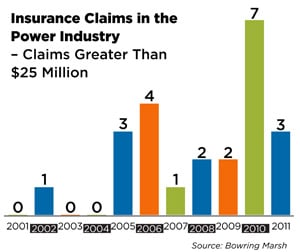Power-generating companies have had at least one major loss in excess of $25 million each year since 2005, and the continuing trend could lead to price and capacity issues if insurers begin to leave the market, according to a report from insurance-broker Marsh.
“Insurers are reconsidering their stance on pricing and conditions for the global-power industry following sustained heavy losses arising from machinery breakdown, fire and explosion, natural perils and associated business interruption,” says Philippe Du Four, chairman of Marsh's Global Power practice in a statement. “Improving risk-management techniques to reduce claims frequency and costs should be a business imperative for power organizations.”
 The power industry has a number of competing concerns that are contributing to the losses. While demand for power is up globally, requiring generating plants to perform efficiently, the Marsh report notes that the push for efficiency may lead operators to “ask insurers to cover new and allegedly unproven technologies” at new plants.
The power industry has a number of competing concerns that are contributing to the losses. While demand for power is up globally, requiring generating plants to perform efficiently, the Marsh report notes that the push for efficiency may lead operators to “ask insurers to cover new and allegedly unproven technologies” at new plants.
Additionally, older plants are operating beyond their design age, “increasing the risk of loss from aging, interdependent equipment.”
The report also notes that the increasing natural-catastrophe events have a direct impact on power-generating facilities, along with the transmission and distribution system.
Insurers face additional expenses and business-interruption exposure where power interruption occurs in underdeveloped nations. The poor infrastructure can increase costs and cause delays getting equipment to damaged sites to make repairs.
Compounding the issues for insurers, the value of equipment has risen as technology has become more complex and the cost of raw materials has increased. Equipment losses at the largest plants due to breakdowns in turbines, transformers and generators accounted for $1.2 billion of $2 billion in net claims between 2001 and 2011.
The culmination of these losses over the past six years is having an impact, says Marsh.
“If large claims continue to blight the power industry with the same frequency that has been observed over the past decade, insurers' appetite for writing power business is likely to change,” says Du Four. “Many are already taking a much more rigorous approach to pricing these risks. This, in turn, could lead to a reduction in insurance capacity and market competition and, ultimately, rising premiums.”
Want to continue reading?
Become a Free PropertyCasualty360 Digital Reader
Your access to unlimited PropertyCasualty360 content isn’t changing.
Once you are an ALM digital member, you’ll receive:
- Breaking insurance news and analysis, on-site and via our newsletters and custom alerts
- Weekly Insurance Speak podcast featuring exclusive interviews with industry leaders
- Educational webcasts, white papers, and ebooks from industry thought leaders
- Critical converage of the employee benefits and financial advisory markets on our other ALM sites, BenefitsPRO and ThinkAdvisor
Already have an account? Sign In Now
© 2024 ALM Global, LLC, All Rights Reserved. Request academic re-use from www.copyright.com. All other uses, submit a request to [email protected]. For more information visit Asset & Logo Licensing.








